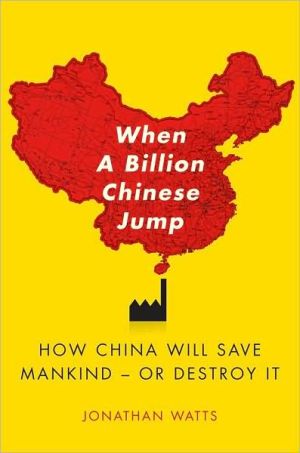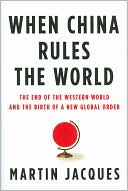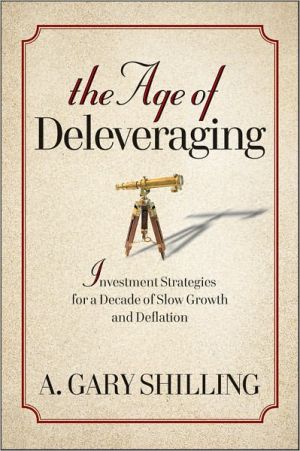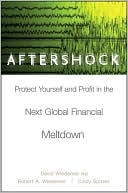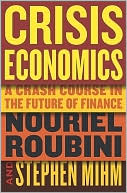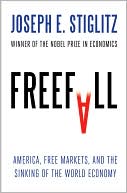When a Billion Chinese Jump: How China Will Save Mankind -- Or Destroy It
As a young child, Jonathan Watts believed if everyone in China jumped at the same time, the earth would be shaken off its axis, annihilating mankind. Now, more than thirty years later, as a correspondent for The Guardian in Beijing, he has discovered it is not only foolish little boys who dread a planet-shaking leap by the world’s most populous nation.\ When a Billion Chinese Jump is a road journey into the future of our species. Traveling from the mountains of Tibet to the deserts of Inner...
Search in google:
As a young child, Jonathan Watts believed if everyone in China jumped at the same time, the earth would be shaken off its axis, annihilating mankind. Now, more than thirty years later, as a correspondent for The Guardian in Beijing, he has discovered it is not only foolish little boys who dread a planet-shaking leap by the world's most populous nation. When a Billion Chinese Jump is a road journey into the future of our species. Traveling from the mountains of Tibet to the deserts of Inner Mongolia via the Silk Road, tiger farms, cancer villages, weather-modifying bases, and eco-cities, Watts chronicles the environmental impact of economic growth with a series of gripping stories from the country on the front line of global development. He talks to nomads and philosophers, entrepreneurs and scientists, rural farmers and urban consumers, examining how individuals are trying to adapt to one of the most spectacular bursts of change in human history, then poses a question that will affect all of our lives: Can China find a new way forward or is this giant nation doomed to magnify the mistakes that have already taken humanity to the brink of disaster? George Monbiot A fascinating, engaging and beautifully written book. It is a masterpiece. (George Monbiot, author of Heat: How to Stop the Planet from Burning)
\ George MonbiotA fascinating, engaging and beautifully written book. It is a masterpiece. (George Monbiot, author of Heat: How to Stop the Planet from Burning)\ \ \ \ \ Library JournalTraversing all of China, beginning in the mountainous northern Himalayan regions and ending in tropical southern Guangdong Province, Watts, (Asia environment correspondent, Guardian) explores a country mired in deep environmental crisis. A country that is on the brink of superpower status, the Chinese state is at the same time delicately balancing economic growth with environmental sustainability. With an accumulation of more than 300 interviews with residents across the country, Watts meticulously examines case studies of horrendous environmental degradation of wildlife refuges, industrial wastelands, greenhouse gases, water exploitation, melting glaciers, cancer villages, science parks, and coal-liquefaction mines. Whether well-intentioned or not, the Chinese government's experiments with alternative energy sources and biodiversity have had far greater adverse effects, as decision making is often at the mercy of local developers and bureaucracies more interested in profits than environmental protection. VERDICT Recommended for those interested in Chinese current affairs, travel memoir, or environmental policy.—Allan Cho, Univ. of British Columbia Lib., Vancouver\ \ \ Kirkus ReviewsGuardianAsia Environment correspondent Watts gives a mixed report card on Chinese environmental awareness, region by region.\ The author maintains a wry but ambivalent tone in this broad survey of where each region of China—selected "purely by my own experience," he writes—stands in terms of environmental sensitivity. China is poised to become both a green superpower and a black superpower. As the world's biggest carbon emitter (coal), China has had a catastrophic effect on other countries in the world, from Siberia's Taiga, Mongolia's ore deposits, Southeast Asia's wildlife, Africa's mines, the Amazon's depleted rainforest and the Pacific United States. However, China is also the world's leader in wind turbines, which line the Silk Road; "the biggest greening campaign on the planet," in the form of tree planting in the logging capital of Heilongjiang; and the first country in the world where fish-farm output exceeds the oceanic catch. China's traditional reverence for harmony in nature and Taoist ideals have given way to "Scientific Development," ruled by efficiency and productivity in order to feed a fifth of the world's population. The great new technological advances that have "moved mountains"—e.g., the Tibetan Sky Train and the massive hydroengineering schemes that would make Mao proud—have also produced irreparable environmental disasters. To get a complete picture, Watts traveled to the coal-blackened cities of Shanxi and the now-eroded dust bowls of Gansu, Inner Mongolia and Shaanxi. He considers efforts to arrest the alarming global warming demonstrated by shrinking glaciers in Xinjiang; delves into specious eco-city plans in northeast provinces of Tianji, Hebei and Liaoning, bordering the most polluted sea in China, the Bohai; and weighs government and private grassroots green programs. Unfortunately, the big picture is bleak. Devastation vastly overshadows hope, and the present authoritative one-party mandate to increase supply at all costs can only lead to human disaster.\ A knowledgeable, in-the-trenches look at China's environmental impact.\ \ \
